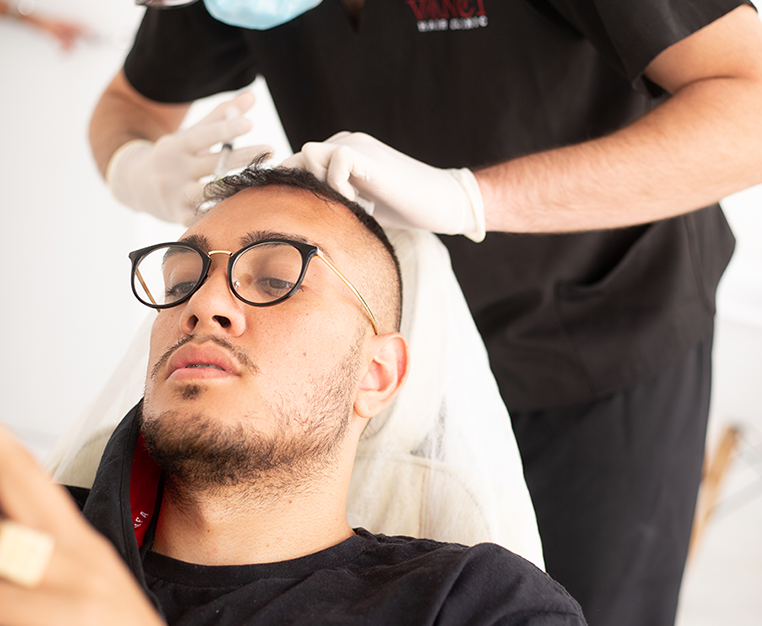High-stress levels often lead to some forms of hair loss in a large number of people. Indeed, there is enough scientific evidence to support the link between stress and a form of hair loss known as telogen effluvium. Telogen effluvium is a fairly common type of hair loss whose leading cause is chronic stress. There is more evidence that more people are reporting increased hair fall since the beginning of the Coronavirus pandemic. In this article, you’ll learn more about telogen effluvium and how you can cope with it.
Stress And The Hair Cycle
You may be wondering if anxiety is to blame if you’re suddenly finding more hair on your pillowcase and in the shower. Whether it’s the stress of the job, running around after a young family, feeling the overwhelm of emotional events, it’s natural to be concerned about stress.
The adult scalp has over 100,000 hair follicles although the actual number will vary between individuals. At any given moment, each hair follicle is constantly shifting between growing and resting. For the majority of the time, most of the hair follicles are in a growing phase. When the follicle transitions into the resting phase, the hair is shed. Telogen effluvium triggers the simultaneous transition of many hair follicles into the resting phase. Consequently, this sudden shift results in excessive hair shedding.
What Are The Signs Of Telogen Effluvium?
One way of telling telogen effluvium apart from the other types of hair loss is the presentation of the symptoms. The characterisation of the condition is abrupt onset, diffuse thinning and its temporary nature.
Abrupt Onset
Although telogen effluvium results in an abrupt loss of hair, it is usually up to three months after the trigger. So, you may be having a stressful time right now, but it will only be a few months down the line that the associated hair fall may occur. This delay is because it takes about 3 months for the hair cycle to move from the resting phase until the shedding stage. In addition to stress, other factors that can lead to telogen effluvium include childbirth, severe illness or certain medicines.
Diffuse Thinning
Telogen effluvium presents as diffuse hair loss. Typically sufferers will notice a shrinking ponytail, an increase in pillow hairs or more hair ending up in the shower drain. The amount of hair fall during this period is significantly more than what you would normally experience. It is also common to see more hair on the brush too. The great thing to note is that although your hair may become thinner in places, you will not experience complete baldness.
Telogen Effluvium Is Temporary
As if one piece of good news wasn’t enough, the second thing you’d be glad to know is that hair loss is only temporary. Your hair will return to its normal density, but this process may take up to six months. In rare cases, your hair may fail to grow back to its original length, which may reveal other underlying hair loss conditions.
Is Telogen Effluvium Preventable?
Unfortunately, there currently isn’t any known way to prevent telogen effluvium. Managing stress and maintaining overall healthy hair may mean that the impact is less noticeable and recovery is quicker. Here are a few things you can do to promote and support overall hair health:
- Eat a balanced diet to include adequate protein. Vitamins and minerals.
- Avoid tight hairstyles which pull on your hair’s roots.
- Minimise the use of heating tools, chemical treatments and frequent colour changes.
- Develop a haircare regime that contributes to a healthy scalp and healthier hair.
Adopting coping strategies like meditation and mindfulness will help to relieve daily stresses and prevent the trigger for telogen effluvium.
Getting Professional Help With Hair Loss
Although telogen effluvium is reversible, often it’s not easy just to sit back and wait for the situation to get better. Hair loss can sometimes send people into a panic and a wild goose chase for quick fixes. When it comes to stress-related hair loss, time is the only real treatment you can count on.
If other symptoms such as an itchy scalp or redness and soreness accompany excessive hair shedding, there may be more to it than just stress and hormones. Seeking timely help with trouble hair is essential if you’re to prevent some minor ailments from getting worse.
Even if you suspect that you may be experiencing telogen effluvium, it’s often advisable to seek professional help. You can visit a trichologist or a dermatologist for a diagnosis. Peace of mind will go a long way in ending the vicious cycle that can sometimes ensue when dealing with hair loss.
If you’re looking for help dealing with hair loss, you can turn to Vinci Hair Clinic for expert support. Why not get in touch to book your free consultation and get some advice on how to overcome your hair problems.




